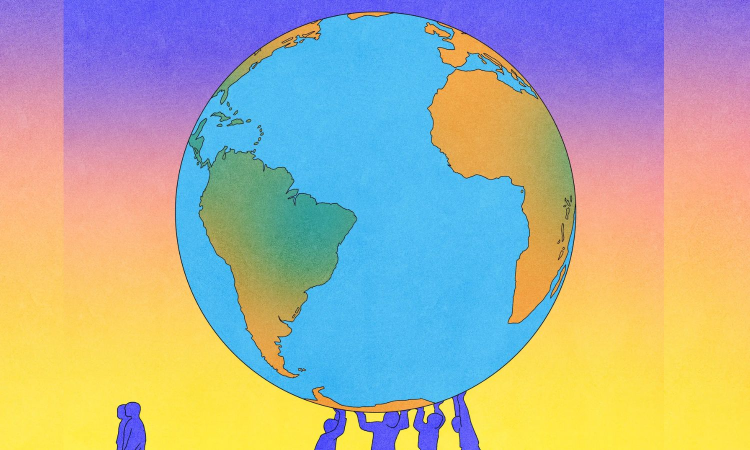Shared progress: Rich retreat, developing nations step up
Developing countries are taking greater responsibility for their own welfare — using technology, reform, and private investment to power growth, strengthen health systems, and protect the vulnerable as wealthy nations pull back from decades of global leadership

Representative Image
• Over the past year, wealthy nations have undermined a decades-old consensus that human dignity is universal and that nations share responsibility for protecting it. The shuttering of the United States Agency for International Development, which I led for five years, is one part of a broader, tragic retreat from a system of foreign aid that cured the sick, fed the hungry, and empowered the poor.
Countries including the US, Canada, Britain, and Germany have slashed billions in assistance. Research published by The Lancet estimates that American aid cuts alone could lead to more than 14 million deaths — 4.5 million of them children under 5. This is a moral failure that will make the world less safe, less secure, and less prosperous.
Yet amid the tragedy, new models are emerging. Leaders across Africa, Asia, and Latin America are taking ownership of their nations’ development, leveraging technology, and — most importantly — attracting private investment, long the greatest obstacle for progress. Their initiatives point to a more sustainable, 21st-century approach to advancing human dignity.
Eighty years ago, powerful nations built a global order around the concept of universal dignity, establishing the United Nations, the World Health Organisation, and the World Bank. That system helped usher in an era of extraordinary progress: transforming AIDS into a manageable condition, saving millions of children from preventable deaths, and cutting hunger in low-income countries by more than 60 per cent between 1970 and 2015. It also benefited donor nations by preventing pandemics like Ebola from spreading and by creating new trade partners that fueled job growth.
But the system faltered as the world changed. It was largely funded and directed by wealthy countries and centralised in large institutions. Donor and public support waned even as global needs grew. Projects became increasingly dependent on overlapping, siloed initiatives that competed for attention and funding rather than coordinated for impact.
In Malawi, for example, about 55 per cent of health funding came from 166 external sources. To keep that support, officials had to draft at least 50 different “strategic plans.” Recipient governments were often bypassed by donor nations and NGOs, while the mounting effects of climate change added new challenges. A decade after the United Nations adopted goals for eradicating poverty and malnutrition, only 18 per cent of targets are on track.
As the old system withers, a new one is taking shape — led by developing nations themselves. It focuses on foundational needs like electricity, which fuels economic growth and quality of life across sectors. It harnesses technology: A.I. chatbots teach farmers new methods; battery storage enables clean energy; innovative drugs extend coverage while reducing doses. This model uses philanthropy to spark change, draws private capital to scale it, and relies on governments’ own investment to sustain it.
In January, I joined more than two dozen African heads of state in Dar es Salaam, Tanzania, to commit to connecting 300 million Africans to electricity by 2030. This effort epitomises the new model: African countries are driving reforms and building the power infrastructure essential to modern jobs, health, education, and nutrition. Localised grids are making electricity and internet connectivity possible for remote communities. By reducing investment risk, these nations are mobilising private-sector capital to ensure long-term sustainability.
Last month, 80 nations from Africa, Asia, Europe, and Latin America met in Brazil to advance one of the most effective tools for ending hunger: school meals. About 466 million children benefit from such programs, which also boost attendance — particularly among girls — while creating jobs for local cooks and farmers. Every dollar invested in school meals can yield up to $35 in economic returns. Recognising this, global funding for school meals doubled from 2020 to 2024 — 99 per cent of it from national budgets. When a country funds its own safety net, it becomes more resilient against droughts, climate stress, and other shocks that cause famine.
Also last month, during the UN General Assembly in New York, African leaders — including Ghana’s president, John Mahama — committed to redesigning health systems to be less dependent on foreign aid. They are pledging to finance more of their systems domestically and to attract private investment. Combined with modern technology — including integrated data systems, A.I. support for community health workers, and long-acting drugs like lenacapavir for HIV treatment — the potential for transformation is enormous.
This model is not without obstacles. Leaders must remain committed to reform while guarding against corruption and inefficiency. Severe budget cuts have drained global development of vital expertise. Many nations pursuing this new path face crushing debt crises. To help them succeed, donor countries should forgive debt and direct remaining aid toward catalysing private investment and self-reliance.
Encouragingly, public support for cooperation remains strong. A new Rockefeller Foundation poll of 36,000 people in 34 countries found that while faith in institutions like the U.N. is limited, support for their mission — feeding the hungry and preventing disease — exceeds 90 per cent. Up to 75 per cent of respondents said they would back international efforts if proven effective. The message is clear: people care less about who runs the system and more about results.
As global needs grow, Americans and others still believe in advancing human dignity — they just want to do it better. The world’s new leaders are showing us how. We should help them succeed.
The New York Times



